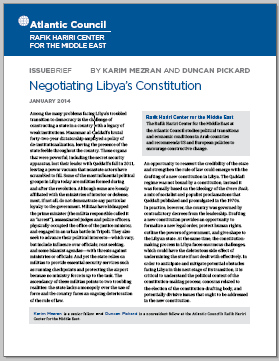Negotiating Libya’s Constitution

Libya’s future as a democracy hinges on the constitution-drafting process and the ability of the constituent assembly to consider and adequately address major political and security challenges.
A new Atlantic Council issue brief, “Negotiating Libya’s Constitution,” examines the political and security context of Libya’s constitution-making process, concerns related to the constitution-drafting body, and potentially divisive issues to be addressed in the new constitution.
Issue brief authors Karim Mezran, a senior fellow at the Atlantic Council’s Rafik Hariri Center for the Middle East, and nonresident fellow Duncan Pickard argue that the constitution-making process faces enormous challenges but also presents a significant opportunity to advance Libya’s transition toward democracy.
The constraints of the Constitutional Declaration, an interim document issued by the National Transitional Council, together with militia activity and the general lack of order create a challenging environment in which the constitution-drafting process will take place. The makeup of the constituent assembly that will draft the constitution, specifically the representation of different regions, women, and minorities, also threatens to complicate the process.
Once the process is underway, key issues will include the independence of the assembly, accountability to the public, the role of sharia (Islamic law), and the debate over federal versus central systems of government (including how it will impact the control of natural resources and distribution of revenue).
The authors stress the importance of the constitution-making process for Libya’s future and the role of the international community in lending its support and providing financial and technical assistance.